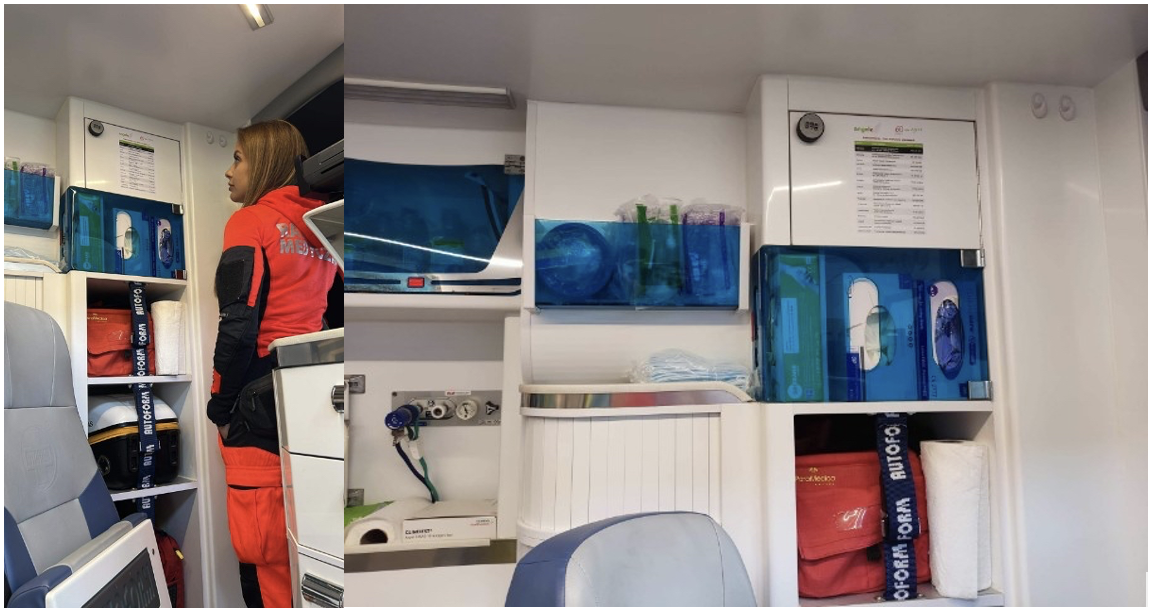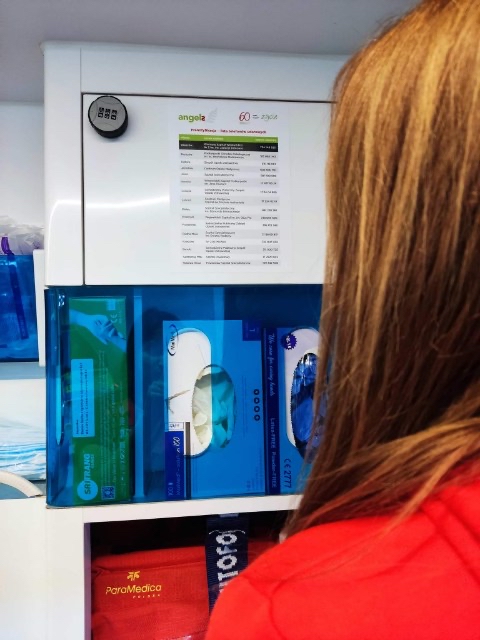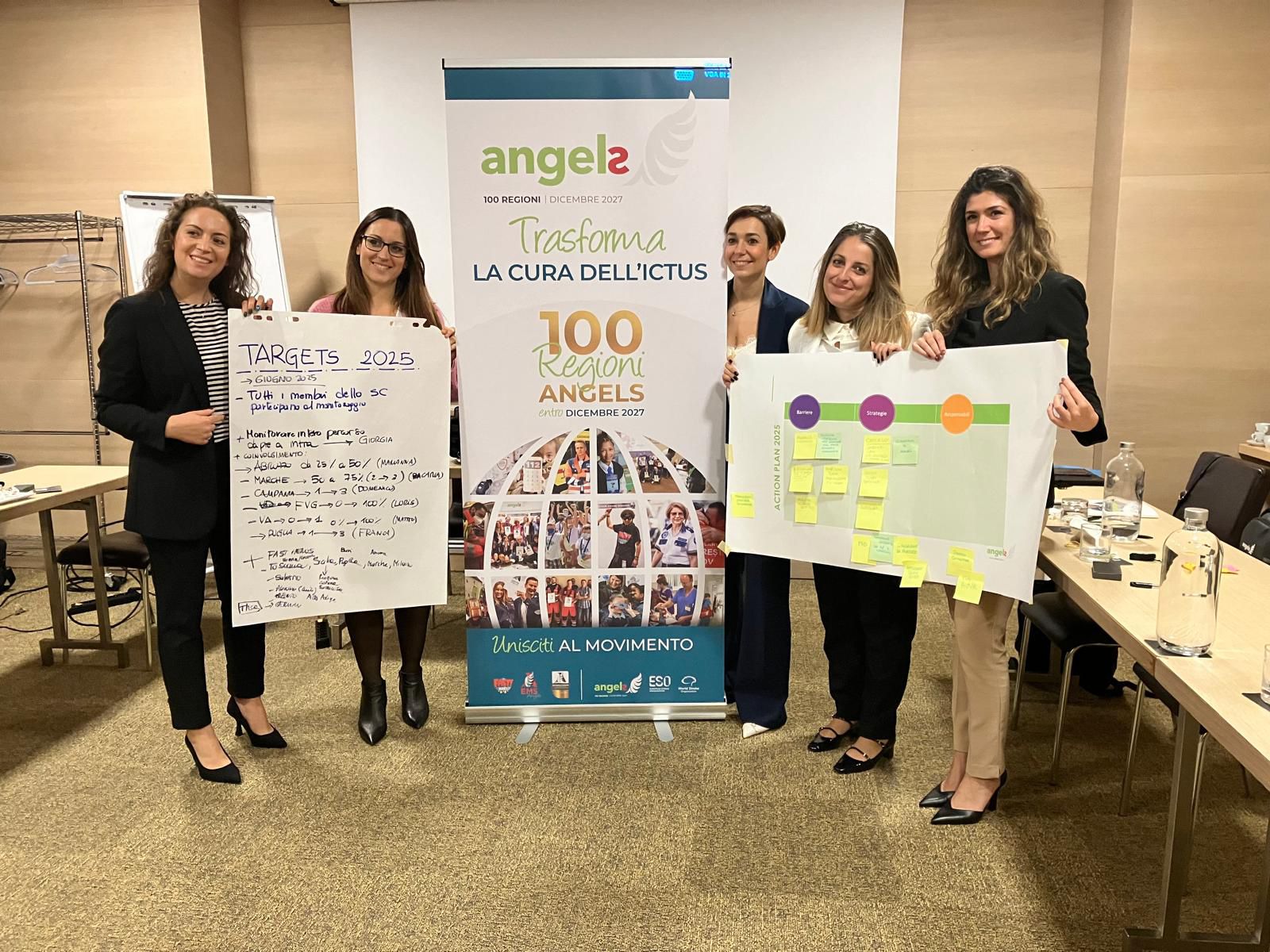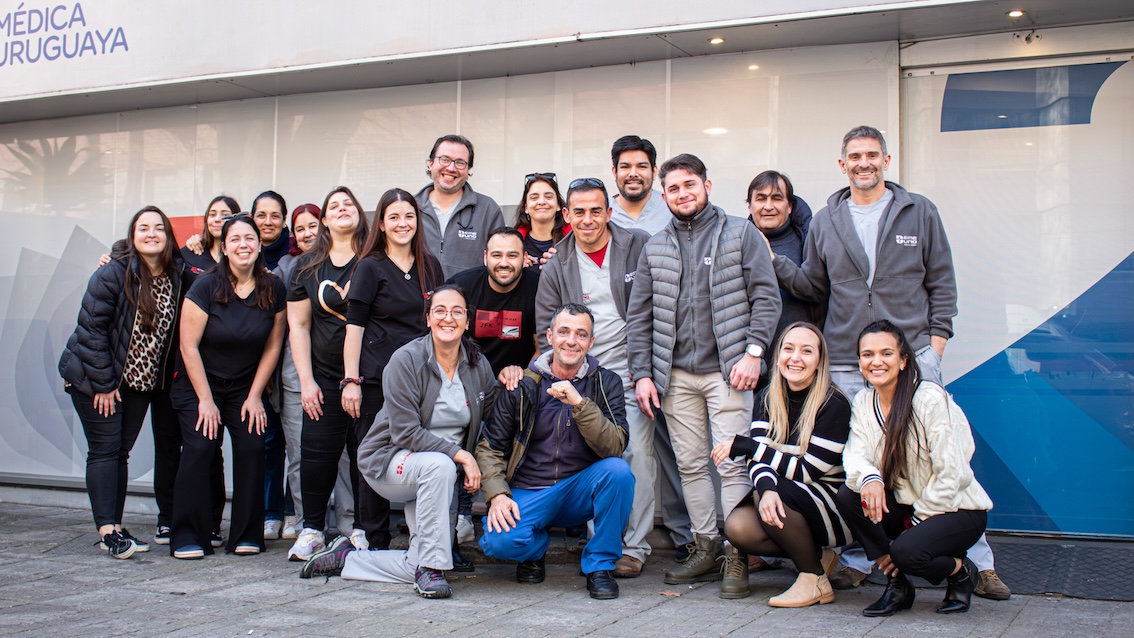
Đó là một nhãn dán thông thường, cao khoảng 21 cm và rộng 15 cm. Ở góc trên cùng bên trái là logo Angels; các từ “60 phút = cuộc sống” xuất hiện ở trên cùng bên phải, danh sách 16 số điện thoại bên dưới. Nhãn dán có một lớp dính mỏng, khi bạn bóc lớp lót, sẽ dính vào hầu hết mọi bề mặt – ví dụ như bảng điều khiển bên trong của xe cứu thương.
Trên thực tế, bạn có thể tìm thấy các nhãn dán giống như nhãn dán này bên trong mỗi xe cứu thương ở Podkarpackie, một tỉnh miền núi ở góc đông nam Ba Lan, nơi trách nhiệm quản lý đột quỵ thuộc về Prof Halina Bartosik-Psujek, chuyên gia tư vấn thần kinh cho khu vực.
Vào ngày 23 tháng 3 năm nay, Giáo sư Bartosik-Psujek đã rất vui mừng chào đón những người đứng đầu khoa thần kinh từ tất cả 16 đơn vị đột quỵ trong tỉnh đến cuộc họp trực tiếp đầu tiên trong khu vực kể từ khi bắt đầu đại dịch. Họ có rất nhiều điều để nói, bao gồm thực tế là sự chậm trễ trong điều trị xuất hiện từ dữ liệu đột quỵ khu vực chỉ ra những thiếu sót trong dịch vụ EMS, nơi cuộc khủng hoảng Covid kéo dài đã làm gián đoạn đào tạo, tăng tỷ lệ nhân viên nghỉ việc và làm giảm tinh thần. Nhân viên cấp cứu trong khu vực thiếu khả năng chẩn đoán đột quỵ trừ khi các triệu chứng rõ ràng; không có thang đánh giá thần kinh nào được sử dụng và thông báo trước viện không nhất quán.
Trong số một số can thiệp sẽ xuất hiện từ cuộc họp khu vực (bao gồm các hội thảo ra quyết định, đào tạo mô phỏng và thực hiện phác đồ FeSS), đào tạo EMS đã được ưu tiên. Cuối tháng 4, chưa đầy bốn tuần sau cuộc họp khu vực, 60 thành viên EMS từ khắp khu vực sẽ tập trung tại thủ phủ Rzeszów đang phát triển mạnh trong hai ngày đào tạo chuyên sâu.
Trước sự kiện này, tư vấn viên của Angels, Katarzyna Putyło, đã dành rất nhiều thời gian nói chuyện điện thoại để gọi một số cụ thể. Phản hồi cô nhận được từ các dịch vụ EMS cho thấy rằng các cuộc gọi đến điện thoại đột quỵ tại một số đơn vị đột quỵ của khu vực thường không được trả lời. Katarzyna có một câu nói mơ hồ rằng lý do cho việc này có thể đơn giản, và khi một số lần đáng báo động các cuộc gọi của cô ấy không được trả lời, cô ấy đã tăng gấp đôi linh cảm của mình: Bản thân các con số có thể sai không?

Giải thích đơn giản
Ý tưởng rằng những lời giải thích đơn giản thường tốt hơn những lời giải thích phức tạp là một nguyên tắc giải quyết vấn đề được quy cho William của Ockham, một nhà toán học và triết học người Anh sinh ra hơn 700 năm trước. “Lưỡi dao cạo của Ockham”, như nguyên tắc được biết đến, cho rằng người ta nên nghiêng về sự đơn giản khi xây dựng một lý thuyết vì những lời giải thích quá chi tiết thường khiến người ta tránh xa sự thật.
Từng người một, Katarzyna đã gọi cho các bệnh viện ở tỉnh Podkarpackie để hỏi, “Số đột quỵ của quý vị là gì – số đột quỵ mà ai đó luôn đón tiếp?” Các câu trả lời khác nhau. Tại một số bệnh viện, điện thoại di động bị đột quỵ không hoạt động sau khi hết tiền. Tại một bệnh viện hàng đầu với lộ trình đột quỵ được tổ chức ấn tượng, khoa thần kinh đã chuyển đến một tòa nhà mới và số lượng của họ đã thay đổi.
Sau khi cô đã xác minh hoặc cập nhật số điện thoại cho mỗi điện thoại đột quỵ ở Podkarpackie, Katarzyna đã sử dụng một đột quỵ cạo râu khác của Ockham. "Thật vô ích khi làm nhiều hơn những gì có thể làm được với ít hơn", nhà logic học vĩ đại đã tin tưởng. Vì vậy, thay vì đưa vấn đề về số điện thoại vào chương trình đào tạo hoặc đưa ra một quy trình mới để phổ biến thông tin cập nhật, Katarzyna đã đặt hàng đủ nhãn dán cho mọi xe cứu thương ở tỉnh Podkarpackie và một vài nhãn dán tốt để dự phòng.

Một công cụ và một yếu tố kích hoạt
Từ các triệu chứng đột quỵ và thuốc cho bệnh nhân đến thang đo thần kinh, khóa đào tạo do Bác sĩ Rafal Kaczorowskicủa Bệnh viện Lâm sàng Tỉnh số 2 ở Rzeszów cung cấp bao gồm mọi khía cạnh của giai đoạn trước khi nhập viện, bao gồm cả video minh họa lộ trình của bệnh nhân có và không có thông báo trước viện. Đó là một công cụ mở mắt cho các nhóm có lộ trình riêng thường kết thúc tại ER; họ đã bị ấn tượng bởi sự khác biệt mà một cuộc gọi điện thoại có thể tạo ra cho cuộc sống.
Nhưng nếu video đưa ra trường hợp cần thông báo trước viện, nhãn dán thậm chí còn làm được nhiều hơn thế. Nó đã xóa bỏ các rào cản đối với việc thực hiện bằng cách lắp đặt trong mỗi xe cứu thương trong tỉnh một công cụ và kích hoạt một hành động cứu mạng sống. Họ không chỉ có các số điện thoại để gọi ngay trong tầm tay, mà thông điệp về thông báo trước viện là không thể bỏ qua.
Sau khi khóa đào tạo kết thúc, Katarzyna ngạc nhiên khi thấy mình là mục tiêu của hàng đợi những người tham gia đang thu thập thêm nhãn dán cho một đồng nghiệp vắng mặt hoặc chia sẻ đề xuất của riêng họ về cách cải thiện dịch vụ.
Với cam kết của mỗi nhóm EMS về việc thông báo trước viện và của mỗi đơn vị đột quỵ để trả lời điện thoại, Katarzyna hài lòng rằng hành động ưu tiên quan trọng này hiện được hỗ trợ từ mọi góc độ – bao gồm cả những hành động của Tiến sĩ Kaczorowski và Giáo sư Bartosik-Psujek có danh tiếng đáng gờm nên vượt quá mức cần thiết để ngăn chặn vi phạm.
Các lợi ích được thực hiện nhờ nhãn dán đã đạt được thành quả như một số bệnh viện báo cáo con đường mịn hơn và thời gian điều trị tốt hơn do thông báo trước viện. Nhưng để thực sự đo lường những gì nhãn dán có thể đạt được, bạn nên theo dõi Giải thưởng EMS năm tới và tìm kiếm các đội cứu thương từ tỉnh Podkarpackie trong số những người chiến thắng.



